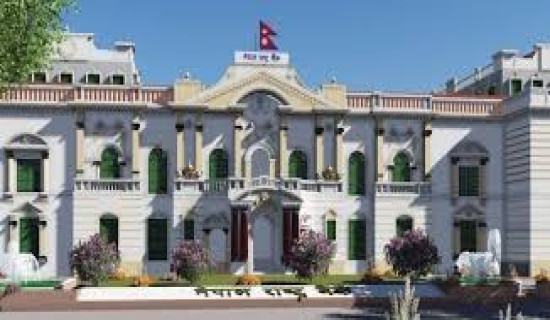- Tuesday, 17 February 2026
Civic Dialogue Fosters Peace, Harmony
The second global peace retreat and conclave was held in Baku - the capital city of Azerbaijan - during the last fortnight in which civic leaders, peace promoters and advocates from different nations such as Nepal, India, Pakistan, Azerbaijan and Saudi Arabia had reaffirmed their commitment to work together to promote initiatives for dialogue and peace in their respective jurisdictions. The Baku conclave follows the first such meet of civic leaders held in Dhulikhel of Nepal last year where several issues and subjects bearing upon peace and importance of peaceful resolution of conflicts had been discussed. The Dhulikhel conclave had avowed to further peace initiatives, collective actions and continue to give momentum to civic sharing and conversations to help address the issues of conflicts and widen the spaces for dialogue and conversation.
It needs no mentioning the fact that some countries represented in the dialogue had gone through destructive conflicts during the contemporary times. And others have experienced conflicts and grappling with threatening social environment because of the state’s repressive measures and machinations. Take the case of Nepal where ten-year-long Maoist-led armed conflict killed around seventeen thousand people and led to destructions of the country’s state and social institutions. The comprehensive peace accord of 2006 ended the long drawn out conflict and paved the way for introducing the new epoch-making phase of federal democratic republic in Nepal. Transitional justice issues are yet to be fully addressed though Truth and Reconciliation Commission (TRC) Act has been endorsed by the parliament recently.
Pestering issues
Similarly, in India conflicts in Kashmir, Manipur and Naxalite violence have remained pestering issues. Azerbaijan has to grapple with Nagarno-Karabakh war which involved Armenia but also drew the attention of the powers with major geopolitical implications. The agreement concluded in 2020 due to the third party mediation calmed the tension along the Karabagh conflict corridor. Pakistan has likewise confronted with several high intensity political conflicts including the conflict in Baluchistan. The Baku conclave made copious references to these conflicts afflicting the countries. Nevertheless, the presentations delivered in the meet discussed several aspects of the conflicts resolution including techniques and tools of handling issues. A presentation delivered by Mirhuseyn Taghiyev, an alumnus at Baku state university pursuing a degree in international relations, on multiculturalism was very interesting and relevant to the contexts where nationality issues have been prominently debated and contested.
The presentation was clear enough to pass the message across the audience that multiculturalism has been the norm governing the relations between peoples and regions in Azerbaijan. The constitution of the Republic of Azerbaijan, according to Mirhuseyn, guarantees equality of rights, freedom of religious belief, unity and alliance of the people. Several such provisions are embodied not only in Azerbaijani laws but also practiced in the people’s way of life. While listening to the presentation on the effectiveness of accommodation of ethno-cultural diversity in Azerbaijan, I was reminded of the fiercely contested debate in Nepal on ethno-national issues when the Constituent Assembly was writing federal democratic constitution during one- and-a half decade ago.
Though Nepal has adopted the federal democratic constitution on the basis of which the state governing structures have been reorganised along federalisation and three-tier scheme of the government has been functionally established, some of the critical ethno-cultural issues resurface time and again. Another presentation in the conclave was delivered by Dil Prasad Magar that dealt with the peace initiatives at local level in Nepal. Referring to the context of violent conflict and deteriorating social environment in this country, Magar shared about a very interesting and well appreciated local concept in building multi-religious peace monument where sacred symbols of major religions such as Hinduism, Buddhism, Christianity, and Muslim would be accommodated, venerated and respectfully put up within a single monument.
Constructive dialogues
Sabin Jawed facilitated a very informative and rich session in which she presented a well researched list of difficult behaviours that tend to pose constraints in conducting fruitful and constructive dialogues in resolving conflicts. Jawed’s presentation was titled “dealing with people who drive you crazy" which listed some worth minding tips in understanding personality traits and styles in the context of handling conflicts. Shridhar Naik – a Marathi writer of repute and Renu Nauriyal – a senior journalist who writes columns for mainstream Indian English daily – jointly shared their presentation on the threats that fake news present to democracy, peace and harmony in communities. They focused, among others, on how social media has both positive and negative dimensions. Fake news not only misinform but also become an instrument for disinformation campaign which become a menacing threat for harmony, peace and social order.
Other interesting presentations featured in the conclave include cyber security threats by Irfan Ul Haque, role of women in peace building by Fidan Karimli and so on. Mention must be made of the thought provoking sharing by Altaf Khan, a senior lawyer and advocate from Srinagar, Kashmir who articulated the issues that underlie the conflict in that part with reference to historical perspectives. Organised under the banner “let us collaborate", the peace conclave was opened by Phurbha Singi Lama – a Nepali Buddhist teacher hailing from Sindhpalchowk. Attended by a sizeable number of civic leaders, activists and peace communicators from Nepal, the conclave proved to be a forum where issues, concerns and contexts were discussed and commitment to work for peace and harmony was pledged. Such civic initiatives not only become a forum for widely networked collaboration, but an interactive learning space, too.
(The author is presently associated with Policy Research Institute (PRI) as a senior research fellow. rijalmukti@gmail.com)

















